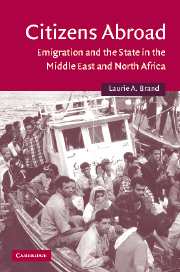Book contents
- Frontmatter
- Contents
- List of tables
- Preface
- List of acronyms
- 1 States and their citizens abroad
- 2 State sovereignty, state resilience
- 3 Morocco: expatriates as subjects or citizens?
- 4 Tunisia's expatriates: an integral part of the national community?
- 5 Lebanon and its expatriates: a bird with two wings
- 6 Jordan: unwilling citizens, problematic expatriates
- Conclusions: transnationalism, security and sovereignty
- Bibliography
- Index
- Cambridge Middle East Studies 23
4 - Tunisia's expatriates: an integral part of the national community?
Published online by Cambridge University Press: 22 September 2009
- Frontmatter
- Contents
- List of tables
- Preface
- List of acronyms
- 1 States and their citizens abroad
- 2 State sovereignty, state resilience
- 3 Morocco: expatriates as subjects or citizens?
- 4 Tunisia's expatriates: an integral part of the national community?
- 5 Lebanon and its expatriates: a bird with two wings
- 6 Jordan: unwilling citizens, problematic expatriates
- Conclusions: transnationalism, security and sovereignty
- Bibliography
- Index
- Cambridge Middle East Studies 23
Summary
A former French protectorate that came to independence in 1956, unlike its often imposing Algerian and Libyan neighbors, Tunisia is both geographically and economically of modest size, although offshore oil discoveries have made important contributions to what was otherwise a largely agriculturally based economy. Whether because of the unpredictability of Libya, which has on occasion expelled Tunisian workers, or the potential spillover of civil war from Algeria, Tunis has pursued policies aimed at insulating itself from the vagaries of regional politics and economics. From independence until the 1980s, a single party, the Parti socialiste destourien (PSD), and the state were led by the country's most prominent independence figure, Habib Bourguiba, a French-trained lawyer who had ideas not unlike those of Turkey's Atatürk regarding modernization and state-building.
In terms of population movement, until the end of the First World War, Tunisia was a region of immigration, attracting those seeking wealth, welcome or asylum from other parts of the Mediterranean basin. It began to export labor to France about the same time Morocco did, but the flows did not become important until several years after independence, when unemployment levels began to rise. Unlike Rabat, Tunis took a more interventionist approach from the beginning, in keeping with the developmentalist leanings of its leadership. While not always meeting targets or expectations, the Tunisian state did establish offices to address placement and programs to provide training.
- Type
- Chapter
- Information
- Citizens AbroadEmigration and the State in the Middle East and North Africa, pp. 92 - 132Publisher: Cambridge University PressPrint publication year: 2006

